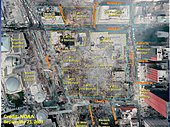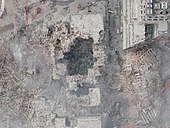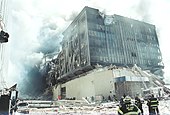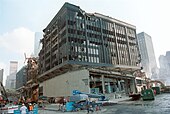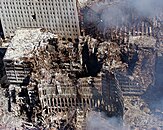6 World Trade Center
| 6 World Trade Center | |
|---|---|
 Southwest corner of 6 World Trade Center after the September 11 attacks | |
 | |
| Alternative names |
|
| General information | |
| Status | Demolished |
| Type | Office |
| Architectural style | Modern |
| Location | Lower Manhattan |
| Town or city | New York City |
| Country | United States |
| Coordinates | 40°42′46″N 74°00′48″W / 40.71278°N 74.01333°W |
| Current tenants | List |
| Construction started | c. 1969–1970 |
| Completed | 1973 |
| Opened | January 1974[1] |
| Demolished | Late 2001 (heavily damaged on September 11, 2001) |
| Owner | Port Authority of New York and New Jersey |
| Height | 93.28 ft (28 m) |
| Technical details | |
| Floor count | 7 |
| Floor area | 537,693 sq ft (49,953 m2) |
| Design and construction | |
| Architect(s) | |
| Structural engineer | Leslie E. Robertson Associates |
| Main contractor | Tishman Construction |
6 World Trade Center was a seven-story building in Lower Manhattan in New York City. It opened in 1974 and was the building in the World Trade Center complex that had the fewest stories. The building served as the U.S. Customs House for New York. It was demolished in late 2001 due to the damage sustained by the collapse of the North Tower during the September 11 attacks. Its site is now the location of the new One World Trade Center and the Perelman Performing Arts Center.
History
6 World Trade Center was first proposed in 1968 as part of the original World Trade Center complex. The building was designed by Minoru Yamasaki, along with Emery Roth & Sons.[2] Construction was completed in 1973 on the eight-story building. 6 World Trade Center was home to the U.S. Customs Service for the state of New York, from 1974 to 2001.[3][4]
Tenants
The following is a list of tenants of 6 World Trade Center prior to the terrorist attacks on September 11, 2001:[5]
| FL# | Companies |
|---|---|
| 7 | US Customs Service |
| 6 | United States Department of Commerce, Bureau of Alcohol, Tobacco, Firearms and Explosives, United States Department of Labor, US Export Assistance Center |
| 5 | — |
| 4 | — |
| 3 | — |
| 2 | Bureau of Alcohol, Tobacco, Firearms and Explosives |
| P | North bridge to World Financial Center, Escalators from 1WTC lobby |
| C | Storage, loading docks, lower lobby, firing range |
September 11 attacks and cleanup
During the September 11 attacks, the collapse of the North Tower destroyed large sections of 6 World Trade Center.[4] Two days later, within the crushed section of the building, two steel beams connected in the shape of a cross were found, believed to be debris from the tower.[6] The beams have since become known as the World Trade Center cross, and is displayed within the National September 11 Memorial & Museum.[7]
The building's ruins were demolished to make way for reconstruction of the current World Trade Center site. AMEC Construction handled the demolition,[8] in which the building was weakened and then pulled down with cables. The new One World Trade Center and Perelman Performing Arts Center stand at the site where 6 World Trade Center originally stood.[9][10]
Gallery
- 6 WTC, the building with the large, black crater in the upper left part of the photo.
- NOAA aerial image following the September 11 attacks. North is approximately upper right on the image.
- Map of WTC site. 6 WTC located in upper left corner of WTC Plaza.
- 6 WTC on fire during the September 11 attacks, visible behind 7 WTC and its footbridge.
- Firefighters spraying water onto 6 WTC.
- 6 WTC following the collapse of the North Tower.
- 6 WTC during Ground Zero cleanup operations.
- Interior of 6 WTC showing debris from the North Tower in the open area, including a piece that became the World Trade Center cross.
- 6 WTC's remains on September 17, 2001.
- View of Ground Zero on September 17, 2001, with 6 WTC visible on the left.
- 6 WTC and 7 WTC's remains.
See also
References
- ^ "History of the Twin Towers". The Port Authority of New York & New Jersey. September 11, 2015. Archived from the original on January 8, 2020. Retrieved May 9, 2022.
- ^ Norval White; Elliot Willensky; Fran Leadon (2010). AIA guide to New York City (Fifth ed.). New York, New York: Oxford University Press. p. 136. ISBN 9780199758647.
- ^ Huxtable, Ada Louise (October 4, 1973). "New Custom House: Modern, Functional, No Match for the Old". The New York Times. New York City. p. 94. Retrieved February 19, 2022.
- ^ a b Lipin, Michael (September 11, 2021). "Ground Zero - Then and Now". Voice of America. Retrieved May 10, 2022.
- ^ "6 World Trade Center - U.S. Customs House". www.cnn.com. Retrieved April 16, 2024.
- ^ "Frank Silecchia, a construction worker, and Father Brian Jordan, a Franciscan priest, discuss the metal cross that they found at ground zero and the faith it offers". CBS News, The Early Show (interview). October 5, 2001.
- ^ "World Trade Center Cross Moving to Permanent Home". CBSNewYork/AP. July 23, 2011. Retrieved November 19, 2023.
- ^ Glanz, James (November 29, 2001). "A NATION CHALLENGED: THE SITE; Engineers Have a Culprit in the Strange Collapse of 7 World Trade Center: Diesel Fuel". The New York Times. Retrieved May 9, 2022.
- ^ Bacon, John (May 2, 2013). "Spire hoisted atop One World Trade Center". USA Today. Retrieved May 10, 2022.
- ^ Fiandaca, Roberto (July 3, 2018). "A Journey Through the New World Trade Center, New York's Symbol of Rebirth". Elle Decor. Retrieved May 10, 2022.

